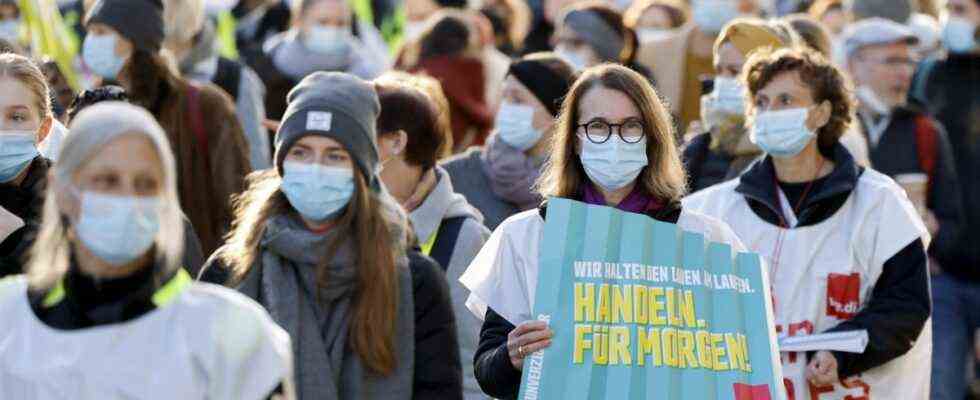In the midst of the worsening corona situation, Verdi wants to significantly expand the warning strikes at university hospitals. With the standouts, the union wants to increase the pressure on employers in the collective bargaining dispute over the public service of the federal states. “Before the third negotiation date, we expect a very broad strike participation in the health sector,” said Verdi chairman Frank Werneke of the German press agency. The association of university hospitals attacked Verdi and accused the union of a lack of charity in the pandemic.
After the first warning strikes without restrictions, the actions in the university clinics and state hospitals would now be clearly noticeable, announced Werneke. The Verdi boss assured: “The well-being of the patients has the highest priority.” From Tuesday on, employees in the clinics in Aachen, Bonn, Düsseldorf, Essen, Cologne and Münster in North Rhine-Westphalia are invited to participate.
After negotiations with no results so far, Verdi and the DBB civil servants’ association will meet on November 27 and 28 in Potsdam for the third round of negotiations with the collective bargaining community of the federal states (TdL). The unions are demanding five percent more salary for the more than one million employees in the country, but at least 150 euros per month, in the health sector 300 euros more. The TdL negotiator, the Lower Saxony Finance Minister Reinhold Hilbers (CDU), had repeatedly rejected the demands as unrealistic.
The DBB chairman Ulrich Silberbach said: “I have never seen employers show so little interest in the concerns and needs of their employees.” The employers would do away with the enormous burdens caused by the pandemic in the health professions, schools, regulatory and supervisory authorities and the police as a selective peak. With reference to the pandemic-related additional expenditure, they even wanted to deny employees compensation for inflation, said Silberbach.
The chairman of the Association of University Hospitals in Germany, Jens Scholz, said the worldThat it shows neither foresight for the care nor of charity for the patients to choose the university clinics as an object of strike. Structural improvements are needed, but the time for work stoppages is the wrong time due to the enormous corona pressure. “Of the 2,000 hospitals in Germany, the 35 university hospitals treat a quarter of all intensive care patients, and up to 40 percent of all ventilated patients.”
Verdi: The strikes are organized with a great sense of responsibility
Werneke assured that the industrial action would be organized “with a great sense of responsibility and tailored to the regional situation”. “If the employees do not react to the ignorant attitude of the employers, they would hold it against them again in the third round of negotiations,” said Werneke. “The shameful thing is that employers say: there is no problem.” They ignored the shortage of skilled workers and the dramatic situation on many wards. For example, a third of the intensive care beds are not occupied because many employees have given up their job exhausted and frustrated.
Silberbach said: “The employers are responsible for all consequences of the strike measures – it is up to them to resolve the conflict with us as soon as possible.” The unions also want to expand warning strikes in other areas. According to Werneke, the activities are to be broadened towards the third round of negotiations. “This affects the entire spectrum of the public service in the federal states, from administration to daycare centers and health services to schools.” Silberbach said that thousands of employees in schools, the police, the judiciary, the financial administration, the technical and road and traffic services had already vented their displeasure in the past few days. “In the coming week, too, these and other industries, including the health service, will be able to speak audibly and visibly with warning strikes and protests.”
Werneke described the negotiations so far as “absolutely frustrating”. The employers denied that the employees, like all citizens in Germany, would be confronted with sharp price increases. “With adventurous computing tricks that are unworthy of finance ministers, the state employers calculate the inflation rate down to two percent,” said the Verdi boss. “That contradicts not only the official figures, but above all the reality of people’s lives.”

